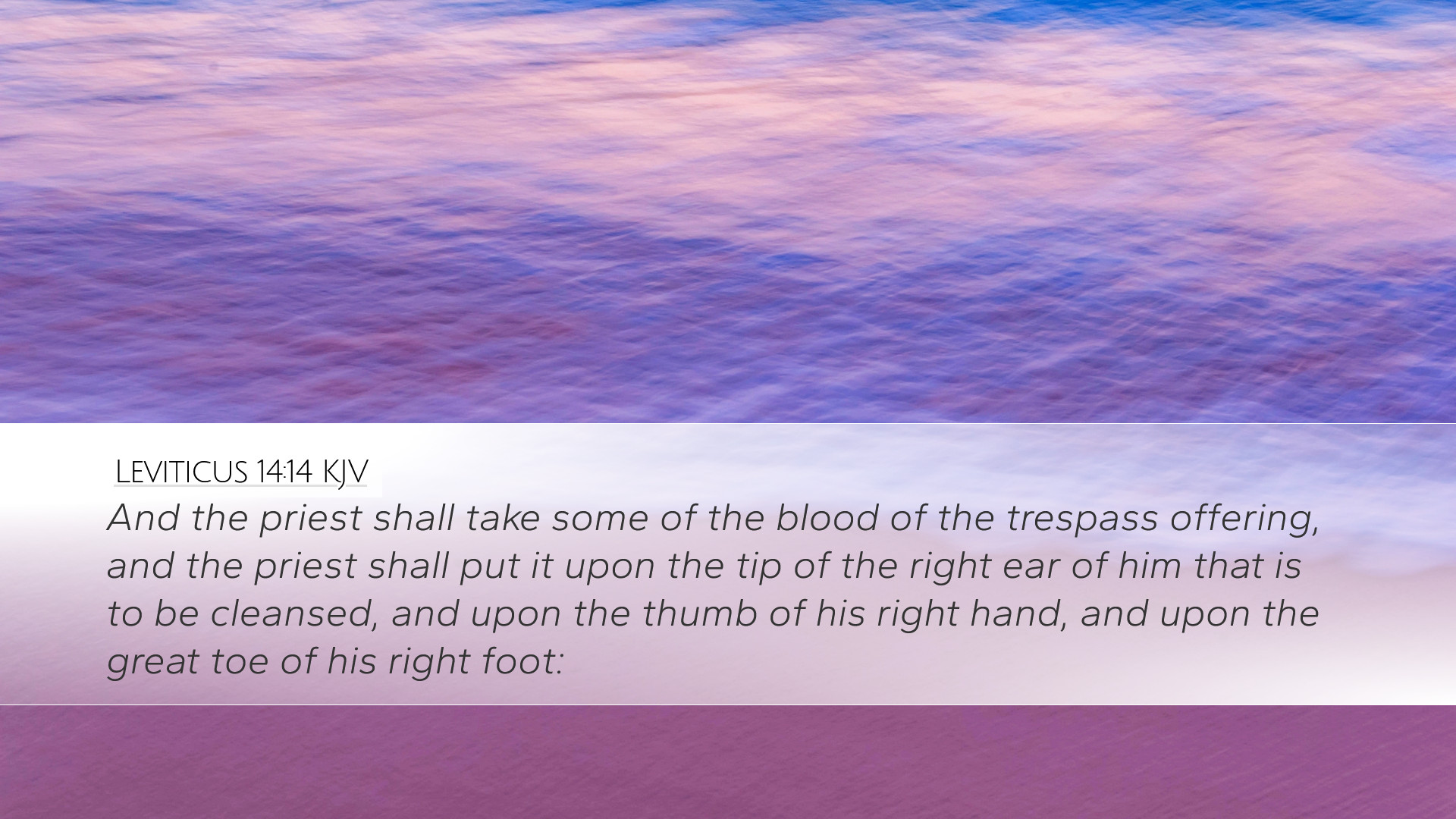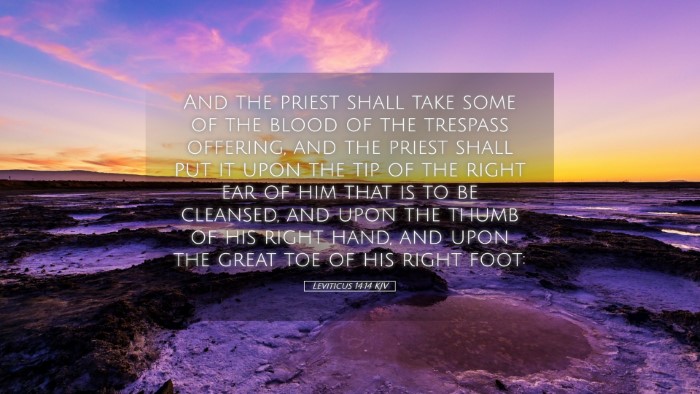Commentary on Leviticus 14:14
Bible Verse: Leviticus 14:14 - "And the priest shall take some of the blood of the trespass offering, and the priest shall put it upon the tip of the right ear of him that is to be cleansed, and upon the thumb of his right hand, and upon the great toe of his right foot."
Introduction
The Book of Leviticus serves as critical legislation for the Israelites, establishing a framework for holiness, worship, and community. In Leviticus 14, the focus shifts to the ceremonial cleansing of those afflicted with leprosy—an important public health measure that also emphasizes spiritual purity. Verse 14 is pivotal in articulating both the physical and spiritual dimensions of cleansing.
The Significance of the Blood
Numerous public domain commentaries elaborate on the profound symbolism attached to the blood in Levitical rites.
- Matthew Henry: He underscores that the blood signifies atonement and is central to the sacrificial system. The application of blood marks the individual as having received purification and divine favor.
- Albert Barnes: Barnes points out that the use of blood for cleansing is emblematic of the high cost of atonement. It reflects God's provision for worshippers to restore their relationship with Him after sin.
- Adam Clarke: Clarke notes that the blood applied to the individual's body highlights the totality of the cleansing process, affecting one's hearing, actions, and walking in life.
Cleansing: A Holistic Approach
The act of applying blood to specific physical parts—ear, hand, and foot—has a rich significance.
- Ears: The right ear represents the importance of listening to God's Word. Henry emphasizes that those cleansed are now to attentively receive divine truth.
- Hands: The right hand is symbolic of action and work. Barnes asserts that the cleansed individual's subsequent actions should align with righteousness and serve God's purposes.
- Feet: The great toe signifies direction and walk. Clarke elucidates that the cleansed are called to walk in newness of life, following the path divinely appointed for them.
Priestly Mediation
This verse also accentuates the role of the priest as a mediator. The burden of administering atonement rests upon the priest.
- Matthew Henry: He highlights that the priest’s ministry illustrates the necessity of intercession. In a sense, Christ fulfills this priestly role, providing a means for us to return to God.
- Albert Barnes: Barnes argues that the priest’s actions reflect the church's ongoing mission to present individuals before God for cleansing and restoration.
- Adam Clarke: Clarke adds that the priest symbolizes authority in religious practice, reminding us that God's order must be followed for true restoration to occur.
Spiritual Implications for Today
For modern-day readers—pastors, scholars, and believers—this verse speaks volumes about the nature of sin, atonement, and the continual need for spiritual purification.
- Atonement: The language of blood and sacrifice is predominant throughout Scripture, culminating in the ultimate sacrifice of Christ. As Barnes notes, these rituals were shadows of the reality to come.
- Holiness: The physical application of blood denotes that our entire being—hearing, doing, and walking—must be redeemed and directed by God's Word and presence, as emphasized by Clarke.
- Community Responsibility: The process of cleansing was conducted publicly, reminding the faith community of their shared responsibility in supporting one another towards holiness, a concept highlighted by Henry.
Conclusion
Leviticus 14:14 serves as a vital reminder of the holistic nature of spiritual cleansing andat sometimes uncomfortable need for sacrifice in the journey to restoration. The insights gleaned from esteemed commentaries help frame the intricate relationship between the Old Testament practices and New Testament truths.
For pastors and theologians, this passage provides fertile ground for preaching on themes of purification, redemption, and the comprehensive nature of God's healing. As we meditate on the significance of this verse, may we embrace the ongoing work of cleansing in our own lives, underscoring that the transformative power of the blood of Christ extends beyond mere ritual into a vibrant, living relationship with God.


